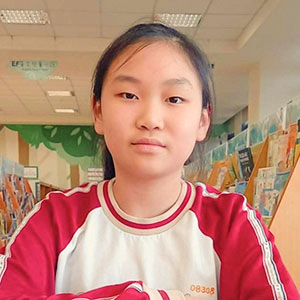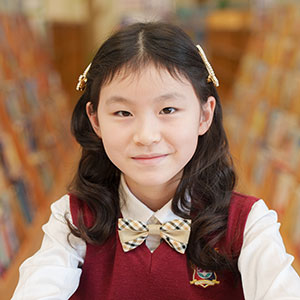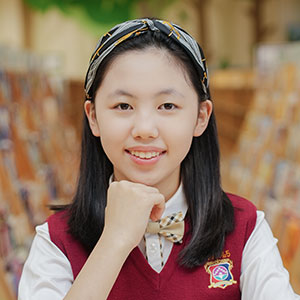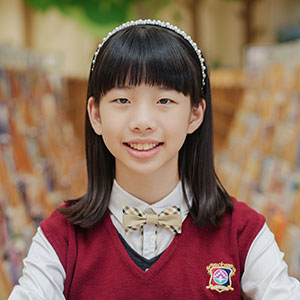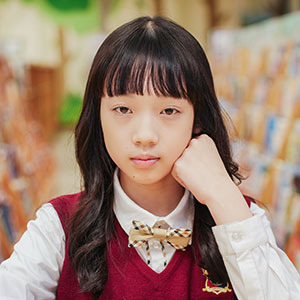Q1: Good afternoon, Ms. Sun, what is your favorite performance?
To be honest, this is the most difficult question for me to answer. Every time I was interviewed, people would ask me this question, and I would tell them that they were putting me in a difficult position, because every performance was an achievement that I had made with my own blood and tears, and with my own health. So, for every performance, I almost used up my life and energy to play that role. My personality is that I don't give in, so when I entered this field after never knowing how to sing, the first thing I had to do was to be brave and learn Taiwanese, just like your classmates. If you don't learn Taiwanese, you won't be able to get on the stage of the Taiwanese opera. Then I started from scratch. I did not know how to sing, and it was even more difficult for me to recite because the Taiwanese language we recite is a four-verse couplet. A four-sentence couplet means four sentences linked together. Why is it called a four-verse couplet? Because there are seven characters in each line of a Taiwanese opera, and the last character is the rhyme, so the last character in each line must rhyme, and it must be either flat and oblique, or oblique and flat. The last word of the four lines must have a rhyme, which is "平平仄仄" or "平仄平", or "平平仄平". It is only when there is a rhyme that it sounds good. Let me give you an example. We all know very well that there is a template for the national anthem of the Chinese opera, which is called the anthem of the opera. Nowadays, children may not know how to sing the national anthem of the Republic of China. But the national anthem of the opera must be learned. The national anthem of the Chinese opera is for every student, we call them children. The first thing you need to learn is this song: "Riding a White Horse", "Riding a White Horse Through the Three Gates", which is called the "Seven Character Tune". And this is just the first line. Okay, is "Riding a white horse through three gates" one of the seven characters? Pay attention to the last word - Guan. Change your clothes and go back to the Central Plains. Yuan and Guan rhyme. It must rhyme in Taiwanese. The third line is that no one cares about Xiliang (a country around 400-421 A.D.) because he (Xue Pinggui) has become the emperor of Xiliang, but he misses Wang Baochuan the most. First thought of Wang Baochuan (Taiwanese). Wang Baochuan was his original wife, who stayed in the Central Plains and stayed in a cold house for 18 years, waiting for this gentleman to go to the army. She was waiting for Mr. Wang to join the army. After the army, he stayed in Xiliang and married the princess of Xiliang and became the king of Xiliang, so he did not know that his wife was waiting for him in the Central Plains and that her heart had changed. So he didn't know that his wife was waiting for him in the Central Plains and his heart changed. Later, he received a letter in blood and realized that his wife was still there, and Wang Baochuan was still there, so he rode a white horse and walked through the three passes in the night. This song tells this story. Do you understand? So, he rode a white horse through the three passes, changed his clothes, and went back to the Central Plains, leaving Western Liang unattended, thinking of Wang Baochuan. Doesn't that rhyme?
What the teacher wants to say now is that in case you make up words, I just said that I don't know how to sing them, and I don't know how to recite them. Because we didn't have scripts in the past, we had to think of our own words and make them up ourselves. So, if I don't know how to do it, I will ask someone to teach me. How do I sing the lyrics? How should I sing the lyrics? How am I going to pronounce the words? For example, I couldn't sing or practice the song I just sang. People like me who come to learn theater are not very good at making up their own songs. In the past, this was called improvisation, unlike the current system of choreography. In improvisation, you think for yourself and make up your own words, so maybe I remember the first word or the first line, like the first line of "Riding a white horse through the three passes", I remember it, but I may forget the second line, and then I will add some dummy words into it. For example, the word "plain clothes" refers to the fact that he took off the emperor's clothes and changed into the clothes of a commoner to cross the border and return to the Central Plains from Western Liang. So, the word "Su Yi" is meaningful, that is, a commoner's dress, but if you forget the word, you don't know what kind of clothes he is wearing, so you will make up something on stage, and if you make up something randomly, you will get into trouble. The people behind the stage will remind you that you are dressed in plain clothes, and that you have just used the wrong words, that is, you have recited it wrongly. So, I don't know how to sing or recite like this. Acting is performing, and performing is simpler for me. Because I joined this profession at a relatively old age, I joined at the age of 26 and started as a student from the beginning. If there were kids studying at the same time as me, they were all in their teens. The troupe doesn't accept people as old as me. It takes a lot of time to train people of my age. First, the limbs of the body begin to stiffen. You may not be able to practice kung fu. So, they let me sing and recite first, and it is easier to learn to sing and recite. However, I did not know how to compose, so I had to ask my sisters-in-law everywhere. There are seven houses in the family, seven brothers and seven daughters-in-law, and only the one in the third house grew up in Taipei City, was educated in Taipei City, worked in Taipei City, and didn't know how to sing opera at all, while the other daughters-in-law were the main characters. The other daughters-in-law are all main characters. They are married today and will perform on stage tomorrow, so they are all very good at what they do, and I'm the only one who can't do it.
Q2: Once a dusky business, opera is now performed in the National Theater, the country's highest performing arts hall. In addition to the change in stage effects, what has changed for you as an actor in this process?
As a female, we are quality women who should not be put on the sidelines too often, nor should we often float around like talented women. So, when I am benched, do you know what I do? We learners do not take notes hastily because we are well-educated. When I studied accounting, I carefully noted down the lines he composed beautifully. His facial expressions were excellent, and I swiftly recorded the scene. How did these seniors perform? I quickly documented it. Why do I pursue this work? It's because I aspire to take his place one day. I aim to rise to the position of a leading man or woman. I don't just sit back and relax; when there's no performance, the children head backstage to relax, and I sit attentively watching. It's a matter of being prepared for the opportunity to step up when it arrives. When one of the leading men fell ill, after years of waiting for him to grow sick, many of my predecessors had been discussing it for a long time, pondering who could replace him. No one stepped forward. Mr. Liao, they were all eagerly anticipating. It seemed like I dared to challenge his position. I had memorized it so well that I was sure I could perform, and it's important to show them what a quality woman can achieve. I assured myself and others that I wouldn't embarrass them, as they had observed my performances so often. I've been diligently training, so I felt a bit anxious. However, under the circumstances, he reluctantly allowed me to step in. Unexpectedly, the young actor also performed exceptionally well. Within just 40 minutes, I began discussing details with all the co-stars and then engaged in dialogues and performances. I almost had the protagonist's character down to a science, yet the first time is always nerve-wracking. The protagonist assured me he wasn't nervous, but being on stage always brings an added tension. The academic ambiance of Taiwan University was where we first achieved the pinnacle of opera performance. All the professors, experts, and university students clandestinely watched the play from the wings. For instance, family members or police officers, due to their elevated knowledge and discernment, watched the opera with a keener eye than the ordinary audience, perceiving it through a magnifying glass. On that day, I was somewhat anxious about being discovered, so I darted onstage as a last-minute participant. I brought all my prepared materials and to my surprise, none of the audience noticed that I had joined the performance as a substitute. It felt like I had successfully rescued the production. This underscores the importance of paparazzi - they must always be protected. Acting is more than mere performance; it requires redemption and deep understanding. You cannot simply consider yourself a minor character; I insist that all actors and actresses must excel in all roles. Consequently, if I were playing a supporting character, I would respect that character. Nonetheless, my secondary goal, aside from becoming a leading actor, involves being the troupe's savior once I assume that role. This understanding stems from recognizing the opera's challenges; if an actor can take on multiple roles, it presents significant advantages for the troupe. Given that our budget doesn't allow for hiring numerous performers.
Within the family, beyond your performance, the most crucial aspect is not adhering to traditional patterns. You may encounter various challenges requiring constant adaptation. Thus, I spent my entire 26 years preparing for them, culminating in me becoming a leading man after seven years of training. I commenced practicing the role of a man. After three years, I realized the significance of female actors playing male roles in opera. It's a peculiar phenomenon; female actors portraying male roles have significantly boosted ticket sales, whereas audience response fluctuates when male actors portray those roles. It’s challenging for a woman to play a role as a man. Firstly, it's challenging for a woman to exude more elegance than a man in portraying male roles. Despite being a woman on stage, audience preference gravitates towards watching elegant performances fused with everyday life elements, such as finger portrayals. The young generation must comprehend how individuals react and how to address them. If addressing someone, but they preclude being addressed by name, actions should be employed as substitutes. Frequently, we engage in mime performances, negating verbal communication and encouraging movement-based expression. Onstage, audiences favor graceful and elegant performances, necessitating life's embellishment to amplify warmth and beauty. In the field of opera, we challenge ourselves, for ourselves. There are only a few veterans in this field who have taken on lead roles. Perhaps I've only heard of two senior women who have played the lead role—no one else has had that experience. That's why I enjoy encouraging people to tackle things they're afraid to try, to do things they're scared to do. I refuse to remain within a comfort zone; although it would be the easiest for me to continue playing male roles or horsemen. Despite smaller troupes being willing to cast me in supporting roles, I never had the chance to take on a senior role in my troupe. Therefore, I pushed myself to excel in this family. Ultimately, I earned the lead role.
However, do you know where I first began as a supporting actor? We staged a play inspired by 'The Lion King', which not only gained popularity in Taiwan but also had successful runs internationally. The director entrusted me with the role of a dashing, powerful martial artist—the most straightforward choice for me. My reputation and recognition grew rapidly to the extent that every time I was cast in that role, everyone anticipated my appearance. Having 'The Lion King' poster raised expectations—"Ms. Sun will portray the Lion King today"—yet, in the end, the applauded role wasn't what everyone expected. Subsequently, I would converse with the troupe leader, reminding them not to disappoint and to cast me as a robust martial artist. The audience craved a stellar performance. During rehearsals, the director reiterated repeatedly that I couldn't just portray someone simple. However, the performance was a huge success.
I always want to challenge myself to play different roles, especially now that the elders should pass the tradition and responsibilities to the young generation. Sometimes, I take on minor roles in a show so that the young ones can start taking charge and develop their own fan base. Gradually, it will be the young generation that manages the troupe and inherits our cultural legacy. I hope to pass on my knowledge to them so that this art will live on forever.
Q3:May I ask what makes Ming Hua Yuan and Ms. Sun so persistent in not giving up the traditional art so easily?
It's very easy for me to tremble before going on stage, but once I'm on stage, I don't care if I'm performing alone or with someone else. However, I was just a little desperate and scared. I couldn't sit for more than half an hour while observing others without actually trying to perform myself. I told myself that I have to stand up; I have to at least try to contribute to the troupe, even if it's just practicing different roles in the troupe. It's just the basics. But with me being 26 years old and getting married then joined the family. I joined the troupe at 30 years old practicing martial arts, it’s very challenging. When I started performing, it really felt like an exchange of my life for my achievements, but initially, I didn't want to believe that I had to be a big hit. No, I just hoped that I could be recognized within this family in their hearts because I am the only daughter-in-law who can't sing and perform on the stage. I hope the whole family can acknowledge me. I am grateful to my family for tolerating me. I feel that in this family, special consideration cannot leave us the third sisters-in-law invisible on the stage. My father-in-law will not allow us to live a life like a drama, he also did not lead this kind of wandering life as the family needs to travel around to perform in different locations. We always moved during the mid-night and started preparing the stage when we arrived at the venue. Then the whole family got ready to rehearse. So, they protected me very well like a guest. At first, I thought that the whole family was working so hard to make the opera thrive. In the Republic of China in the '50s, '60s, and '70s, Taiwanese opera was never favored; it had no standard meaning. So, we see the goodness. The development of Taiwanese Opera tells the story of the 1950s. Many opera groups disbanded because they could not sustain. Facing the rise of technology, Ming Hua Yuan has persevered for 95 years now. It's the faith given to us by our parents. We have to persevere; the elders are helping the second generation join, and then I feel the whole family is into opera. On the nail, the honor of Taiwanese opera has been regained; it is the only original opera in Taiwan. Only in Taiwan can you find this opera, not in mainland China. So, this is the most characteristic of Taiwan, and this is why we go abroad to perform every time. Taiwanese Opera goes out to preserve cultural integrity because it truly represents the most authentic culture of Taiwan. But at one time, it was listed as an industry with no standards, and it was once considered an exiled industry. Based on the previous mentioned, we underwent three revolutions.
Q4: What can elementary school students do to promote Taiwanese operas?
You are the first that can initiate the action of promoting the Taiwanese Operas. Influence your family and let them know what Taiwanese Opera is. Today, you have more knowledge than them. You understand that Taiwanese Opera is the most important culture in Taiwan, the only one of its kind. It's crucial to support our own culture for us to shine on the international stage. We need to show foreigners that Taiwan has a rich culture. Therefore, it's essential for everyone to come together, love and protect this culture for its sustainability. Start by influencing your friends and family. Encourage them to take you to the theater to watch Taiwanese Opera, starting with the Feng Shen Bao Bao Troupe. This children-friendly troupe uniquely blends song and drama, delivered in Taiwanese. It's a great way for children to learn Taiwanese and experience opera elements through the performances that bring stories to life. After enjoying the Feng Shen Bao Bao Troupe, consider watching performances at Ming Hua Yuan to explore various models of opera. Attendees can witness different elite groups showcasing Taiwan's culture on international stages. Alongside preserving tradition, these performances embrace innovation, presenting new plays each year suitable for all age groups. The ticketing system is family-friendly, offering joint tickets that allow entire families to enjoy the opera together. Developing a sense of cultural preservation is vital. Even if there's a street performance, support Taiwan's culture by attending the theater, where the true essence of Taiwanese Opera lies. Additionally, efforts are made to provide free theater experiences for students, ensuring broader access to the arts. It's important to support local initiatives and foster a love for Taiwanese culture from a young age, nurturing a deep appreciation for the arts and traditions of Taiwan.



